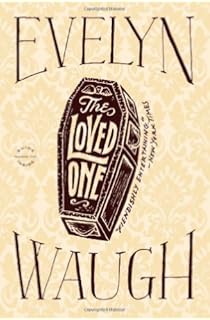Friday, April 28, 2017
On "The Loved One" by Evelyn Waugh *****
I last read this book toward the end of my senior year of high school. I remember loving it and wishing I'd picked Waugh for my senior paper instead of Thomas Hardy (who I'd chosen as the least of the uninteresting British writers much earlier in the year). Yet strangely, I never went back and read more of Evelyn Waugh.
And now, here is it nearly thirty years later, and I'm finally picking him up again, with the intention of reading much more of this humorous British novelist.
The book, which I remembered was being about a love affair between morticians, one of whom was a plagiarizing poet, was enjoyable again, as it was those decades ago. I can see why I liked it so much in my late teen years: it was funny, and it was dark. The latter probably would have made me like it even more in my early twenties. For it has, under its core, some of the same themes that pop up in many other modernist works. I was reminded quite a bit of the two most famous novels of Nathaniel West, both because of its setting and because of its use of advice column letters.
Also of note--things I didn't remember: The book is about Hollywood, most specifically British writers in Hollywood. There's a good amount of skewering of the movie industry in addition to that of the funerary industry. And the morticians--well, one of them works at a pet cemetery. I laughed out loud at some parts.
I could say something here about how the interest in death is also about the death of the soul, how the main character's interest in becoming a minister merely to make money represents the loss of religion, how he returns to art to replace religion, after losing his artistic abilities to the materialist interests bound within capitalism, which even tries to sell you on burial spots for your pets. Or I could focus on the title and try to ferret out what it is Waugh is saying about our "loved ones." But those sort of philosophical ideas, while perhaps interesting, to me now seem perhaps a bit put on and also lead me to the one fault I have with the novel in these my older years: it doesn't have much heart. It is a vicious book. Funny, but in the end, these characters are cardboard and/or dreadful, and while I enjoyed the book, I didn't find myself caring much about the people themselves. This isn't to say that all books must accomplish this; I like scathingly funny works, dark works, works with characters no one can love too--but I probably prefer most those books that in the end make me feel, and care.
Subscribe to:
Post Comments (Atom)







No comments:
Post a Comment